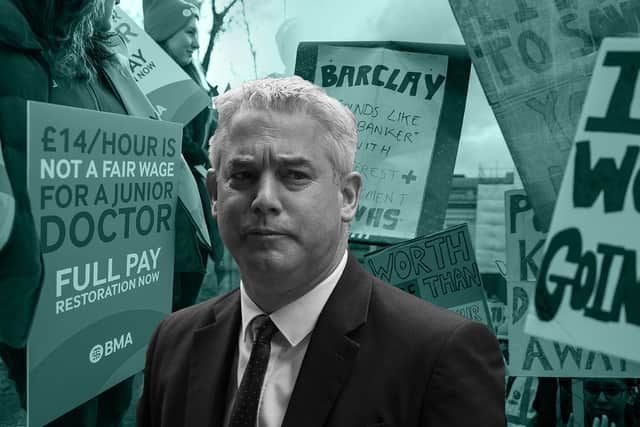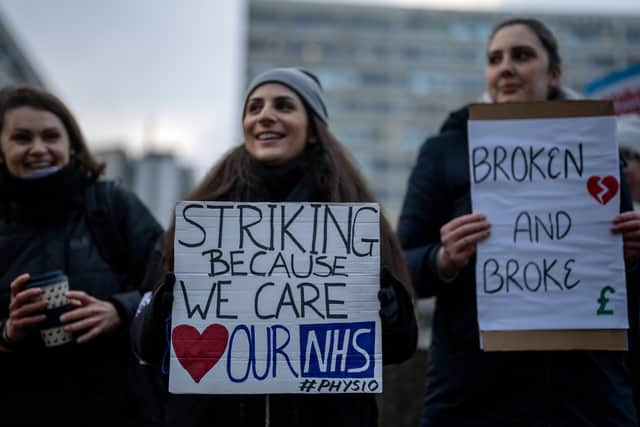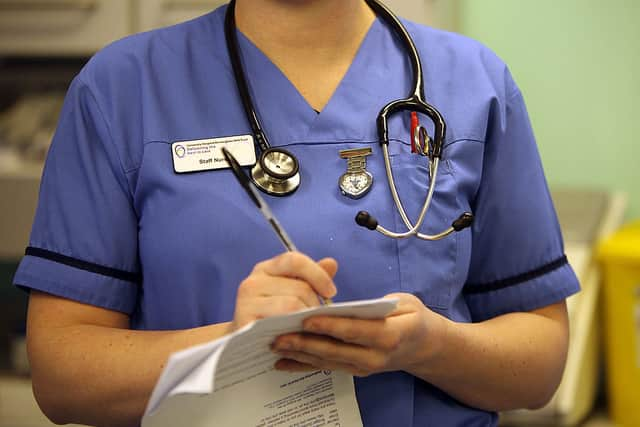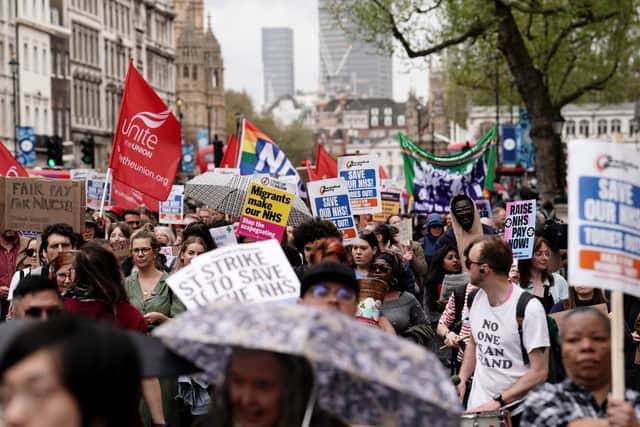When will NHS strikes end? Nurses push for double-digit pay rise as most health unions accept government offer
and live on Freeview channel 276
Most NHS unions have voted to accept the government’s pay offer after months of industrial action, but the UK's biggest nursing union is holding out for a double digit pay-rise for members.
Unison, GMB, the Chartered Society of Physiotherapists, and the Royal College of Midwives were among those who supported the revised deal, which consists of a 5% pay rise plus a one-off lump cash sum. However, members of the Royal College of Nursing (RCN) and Unite both voted against the deal.
Advertisement
Hide AdAdvertisement
Hide AdAt the RCN annual congress on Monday (May 15), general secretary Pat Cullen called on Health Secretary Steve Barclay to restart pay negotiations with nurses, with a proposed rise in double digits. Union members will begin a new ballot for fresh strike action on 23 May, after the existing six-month mandate ran out at the start of the month.
But a Department of Health spokesperson said that the Government’s pay offer was “fair” and said that there were “no plans to reopen negotiations on this deal”.
Health Secretary Steve Barclay earlier said he now plans to impose the deal for all of those on the Agenda for Change pay scale, meaning more than a million NHS workers in England will see their salaries increase. Unions have urged him to to ensure staff see the money in their pay packets as soon as possible.


The ballot results were reported at a NHS Staff Council meeting on Tuesday (2 May), where unions first reported the results of their individual ballots on the government’s revised deal - before then voting on whether the government should implement the offer.
Advertisement
Hide AdAdvertisement
Hide AdBarclay said: “I’m pleased the NHS Staff Council has voted to accept our pay offer, demonstrating that a majority of NHS staff agree this is a fair and reasonable deal.
“It is now my intention to implement this for all staff on the Agenda for Change contract and where some unions may choose to remain in dispute, we hope their members, many of whom voted to accept this offer, will recognise this as a fair outcome that carries the support of their colleagues and decide it is time to bring industrial action to an end.
“We will continue to engage constructively with unions on workforce changes to ensure the NHS is the best place to work for staff, patients and taxpayers.”
However, while this development will bring an end to some of the long-running strike action, not all walkouts are set to finish - with the RCN and Unite, both of whom rejected the offer, warning of further strikes irrespective of the decision made by other unions.
Advertisement
Hide AdAdvertisement
Hide AdPat Cullen, General Secretary of the RCN, on Monday (1 May) confirmed the union would press ahead with a fresh ballot for industrial action for the next six months. She said: “Different unions and different professions came to different, but respectable, conclusions on this pay offer.
“The deal being accepted by others does not alter the clear fact that nursing staff, as the largest part of the NHS workforce, remain in dispute with the government over unfair pay and unsafe staffing.”
She then addressed Barclay directly: “Since our talks in February, we have seen the pressures on the NHS continue to increase. The crisis in our health and care services cannot be addressed without significant action that addresses urgent recruitment and retention issues and nursing pay to bring this dispute to a close urgently.
“Until there is a significantly improved offer, we are forced back to the picket line. Meetings alone are not sufficient to prevent strike action and I will require an improved offer as soon as possible. In February, you opened negotiations directly with me and I urge you to do the same now. After a historic vote to strike, our members expect a historic pay award.”


Advertisement
Hide AdAdvertisement
Hide AdThe union also pressed ahead with industrial action on 30 April and 1 May, although initial plans to continue the walkout until 2 May were ruled unlawful by the High Court.
Barclay accused the RCN of being “disrespectful” to other health unions by staging further strike action, adding: “I think the RCN should have waited. They’re a member of the NHS Staff Council. They were part of the negotiations.”
The GMB already announced on Friday (28 April) that it had accepted the government’s offer, with 56% of its tens of thousands of health workers voting in favour. GMB national officer Rachel Harrison said the new pay offer would not have happened without the strike action taken by members.
“Our members recognise that progress has been made,” she said. “From the government originally offering nothing, health workers will be thousands of pounds better off. [The offer] also meets a key GMB demand of a huge pay uplift for the lowest paid, lifting them above the Real Living Wage."
Advertisement
Hide AdAdvertisement
Hide AdBut, she added that “so much more needs to be done for workers if we are all to get the NHS we need”, explaining: “GMB now needs action for our ambulance members – starting by addressing their retirement and unsocial hours enhancement concerns. Today is just one step in the battle to restore NHS workers’ decade of lost earnings.”
Also on Friday (28 April), Unite said that seven out of ten ambulance paramedics had rejected the deal.
The long-running dispute between NHS unions and the government - which concerns pay, conditions, staffing, and patient safety, among other issues - has been going on for some time. Strikes on 6 February formed the biggest walkout in NHS history, with nurses, paramedics, call handlers, drivers and technicians all taking part - a step up from the industrial action in December.
Earlier this month, the government put forward a new offer - which included additional pay for 2022-23 and a pay settlement for 2023-24 - which many unions have now accepted. The lump-sum payment will rise in value as you move up the NHS pay bands - worth £1,655 for staff at the bottom of Band 2, such as porters, cleaners, and healthcare assistants, and £2,009 for staff at the top of Band 5, such as nurses, midwives, and physiotherapists
Advertisement
Hide AdAdvertisement
Hide AdFor those at the top of Band 6, like paramedics, health visitors, and senior occupation therapists, it will be worth £2,162 - while staff at the top of Band 9 will see £3,789. Unison said the lowest pay point in the NHS will now be £11.45 an hour – 55p higher than the voluntary real living wage.
A spokesperson said it believes the deal represents “a fair and reasonable settlement” that acknowledges both the dedication of NHS staff and the wider economic pressures currently facing the UK.
Barclay added that the offer amounts to “a fair pay rise”. He commented: “I hugely admire the incredible work of NHS staff, including during the pandemic and the progress they have made to tackle the resulting backlog... This offer will give nurses, paramedics, physiotherapists and other non-medical staff a fair pay rise while protecting our commitment to halve inflation.”


The Health Secretary insisted however that funding for the pay deal would not come at the expense of patients. “Obviously how these things are funded are a matter for the Chancellor... [But] we have been very clear in terms of the discussions we have had with the trade unions this will not come from patient-facing aspects.
Advertisement
Hide AdAdvertisement
Hide Ad"Of course we will look at areas of underspend, areas of administrative saving and discuss these things with the Treasury in the usual way," he said, before calling on striking junior doctors to follow the other health unions' example, saying the government had offered them the same terms.
“A request from them for a pay rise of 35% is not affordable. That is why we need to see from them the same sort of leadership that we have seen from the trade unions in the Agenda for Change contract.”
Unite general secretary Sharon Graham said of the offer: “The offer... is not one that Unite can recommend to our members, but ultimately it is important that our members make the final decision.”
“Unite will support members in whichever decision they now make,” she said. “[But] it is clear that this Government does not hold the interest of workers or the NHS at heart. Their behaviour and disdain for NHS workers and workers generally is clear from their actions. Britain has a broken economy and workers are paying the price.”


Advertisement
Hide AdAdvertisement
Hide AdUp north, GMB Scotland - which represents staff in the NHS and Scottish Ambulance Service - said its members accepted the improved pay offer by a majority of 59.7%.
Current First Minister and former Health Secretary Humza Yousaf had been locked in negotiations with health unions in recent months amid the threat of industrial action. The GMB, the Royal College of Midwives (RCM), and the Royal College of Nursing (RCN) suspended the announcement of strike action earlier this year to consider the new offer. Both the RCN and the RCM are currently balloting their members, with the recommendation to accept the deal.
The pay offer made to 160,000 NHS staff, including nurses, midwives and paramedics, equates to an average 6.5% increase in 2023/24. The offer is on top of the imposed pay rise already allocated for 2022/23, meaning many staff could receive a consolidated 13 to 14% pay increase over a two-year period.
GMB Scotland senior organiser for public services Keir Greenaway welcomed the acceptance, but warned ministers to heed the warnings of the “sizeable” proportion of the union membership that voted to reject the pay offer.
Advertisement
Hide AdAdvertisement
Hide Ad"We would also warn that no-one in government circles should be naive enough to think this puts the issue of worker value back in the box," he said. "If ministers want to seriously tackle the understaffing crisis in our health service and recruit and retain the people needed to build a recovery of our broken NHS, then the bar must continue to rise for the pay and conditions of staff in the years to come."
The latest development comes amid ongoing strikes by teachers, university staff, and railway workers, in separate disputes over pay, jobs, and conditions.
Comment Guidelines
National World encourages reader discussion on our stories. User feedback, insights and back-and-forth exchanges add a rich layer of context to reporting. Please review our Community Guidelines before commenting.